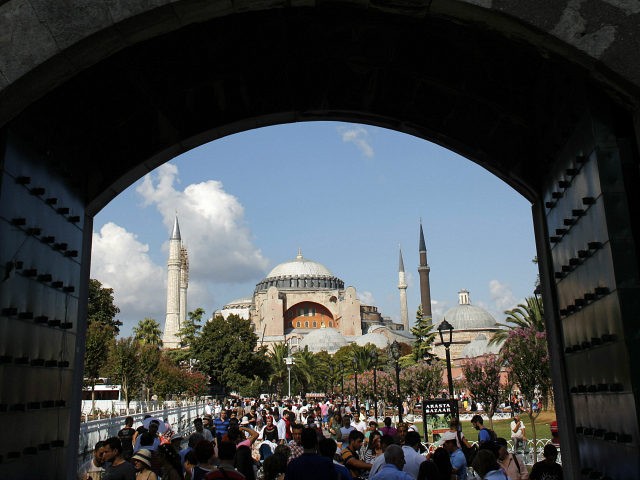The Turkish government is permitting the use of the Hagia Sophia, a Greek Orthodox basilica until the conquest of Constantinople in the Fifteenth Century, for Islamic Ramadan prayers throughout the month, a move Greek officials are decrying as “retrograde” and disrespectful.
On Monday, the Turkish government began broadcasting Koranic recitations and the sahur, the traditional pre-dawn Ramadan breakfast, on public television live from the Hagia Sophia, which as functioned as a museum since the secularization of Turkey by Mustafa Kemal Atatürk. Lisa Daftari of Foreign Desk News reports that the broadcasts will continue throughout the month, representing the first time Ankara has permitted the extended-term use of the Hagia Sophia as a mosque since the Atatürk era.
Daily Sabah, a newspaper favorable to the Islamist government of President Recep Tayyip Erdogan, announced the broadcasts last week, calling the Hagia Sophia “a landmark sacred to both Christians and Muslims” and properly identifying it as a “museum.”
While the leftist Greek executive government of Prime Minister Alexis Tsipras has not issued any official statements on the Islamization of the Hagia Sophia, both the Greek Ministry of Foreign Affairs and the right-wing New Democracy party have issued statements condemning the move. Daftari translates the Foreign Ministry statement as calling the prayers a form of “bigotry… not compatible with modern, democratic and secular societies” as well as an “incomprehensible” move that “reveal[s] a lack of respect for and connection with reality.” Greek newspaper Ta Nea notes that the Ministry also referred to the prayers as “retrograde.”
New Democracy’s representatives, meanwhile, issued a statement calling the prayers “provocative and incomprehensible… and shows disrespect against Orthodox Christians across the world and is not in line with Turkey’s European course.”
The prayers begin shortly after thousands of Muslims congregated at the Hagia Sophia site to demand the right to pray there. In May, crowds chanting “let the chains break/open Hagia Sophia” led by the Islamist group the Anatolia Youth Association demanded the government allow the Hagia Sophia to be used as a mosque. “In the name of thousands of our brothers we demand to be allowed to pray inside the Hagia Sophia mosque,” Salih Turhan, the group’s president, told reporters. The Anatolia Youth Association has previously led other campaigns against Christian icons, including disseminating violent illustrations against Santa Claus, a figure based on the Turkish Christian Saint Nicholas.
The protests triggered some resistance from secular Turkish observers. Writing in Hurriyet Daily News, columnist Burak Bekdil warned that these crowds were indicative of a call for Muslims conquest not limited to Turkey. “Pluralism is a one-way street for the Islamist mind,” he wrote in May, “It is good when it is in ‘infidel’ lands where Muslims are in the minority. It is a big sin in lands where ‘we are the majority.’”
The protests calling for Islam within the walls of the Hagia Sophia also marked the first anniversary of the first Islamic prayers in the cathedral in modern Turkey. In 2015, Erdogan permitted a Koranic recitation within the Hagia Sophia as part of the “Love of Prophet” government-sponsored festival.
That recitation, too, followed protests calling for converting the cathedral into a mosque. At the time, Erdogan’s government appeared open to the idea of using the Hagia Sophia in revenge against Christians. Commemorating the 100-year anniversary of the Armenian genocide, Pope Francis made a statement affirming that the genocide actually occurred, infuriating Turkish officials who continue to insist the genocide of over one million Armenians never occurred.
“Frankly, I believe that the Pope’s remarks will only accelerate the process for Hagia Sophia to be reopened for [Muslim] worship,” Professor Hizli, a senior government cleric, said in response to the Pope’s statements last year.

COMMENTS
Please let us know if you're having issues with commenting.